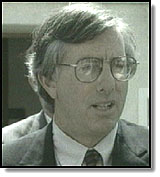
|
US Envoy Welcomes New Middle East TalksThe American envoy to the Middle East, Dennis Ross, says the first meeting between Israeli and Palestinian officials since the suicide bombing in Jerusalem two weeks ago, is a step towards re-establishing security co-operation between the two sides.The Palestinian leader, Yasser Arafat, met senior Israeli security officials in the West Bank town of Ramallah on Sunday night. Mr Ross told reporters: "We're not looking for meetings as an end in themselves. We're looking for results." "Security is something that serves Israeli interests and Palestinian interests. You have a common threat and you have a common enemy and it's important to deal with that as partners." Mr Ross and Palestinian officials say the contacts will continue. But despite Mr Ross's optimism, the Israelis say the renewed talks do not yet amount to a restoration of the peace process. They want tough action from the Palestinian leadership against Islamic militants. But an adviser to Mr Arafat, Nabil Abu Rdainah, insisted that the main issue was political: "Unless they understand there is a peace agreement signed by the Palestinian Authority and the Israeli authorities, unless it's implemented fully and accurately, the crisis will carry on."
Mr Netanyahu has repeated his refusal to negotiate until the Palestine authority takes action against Islamic militant groups in its territory. Speaking in a special interview with BBC Correspondent Lyse Doucet he said "We've asked them to crack down on the terrorist organisations within the Palestinian territories, but so far we haven't seen any action. Terrorist leaders are walking around free carrying their guns. We know who they are, we have a list and we've given it to the authorities, but so far they have done nothing." He added:"Mr Arafat has a choice. He has to decide whether he wants the men with the guns to be roaming around free. Because at the end of the day they will not only attack us, they'll attack him." However the Israeli Prime Minister did outline his proposal for moving the peace process forward. He said he was calling for an acceleration in the peace talks. He said it would give all sides more flexibility if they could address all the relevant issues at the negotiating table. "I'd like to see Yasser Arafat bring whatever grievances he has, whatever differences he has, to the table with me and I propose we go to a final settlement negotiation, precisely as (US) Secretary (of State Madeleine) Albright suggested...but after security is kept." Expectations are growing in the region that Mrs Albright is about to announce a major new peace initiative.
More Palestinian Protests
The problems besetting deeper security co-operation were underlined when spokesman for the Islamic group, Hamas -- speaking in the Jordanian capital, Amman, warned Mr Arafat against the crackdown on Islamic activists that the Israelis are demanding. "It would be dangerous, not just for him...It would lead to Palestinians fighting Palestinians," Hamas spokesman Ibrahim Ghoshe said.
Related sites
|
Diana, Princess of Wales, 1961-1997
Conference 97
Devolution
The Archive
News |
Issues |
Background |
Parties |
Analysis |
TV/Radio/Web
Interactive |
Forum |
Live |
About This Site
News |
Issues |
Background |
Parties |
Analysis |
TV/Radio/Web
Interactive |
Forum |
Live |
About This Site
© BBC 1997 |
politics97@bbc.co.uk |


